What is the NSCA ? Do you want a personal trainer certificate valid in all countries of the world? If you are thinking of doing a coaching course, this interests you. The National Strength and Conditioning Association title may be the option you are looking for. To get it, you will have to pass an exam. We explain everything!
NSCA-CPT, an approved personal trainer course
The National Strength and Conditioning Association (NSCA)was founded in 1978 and is a non-profit association dedicated to the promotion of strength and conditioning and sports science related professions worldwide. The NSCA exists to maximize the impact of the professional community by disseminating evidence-based knowledge and its practical application through industry-leading certifications, research journals, professional development services, networking opportunities, and continuing education. The NSCA community includes more than 60,000 members and certified professionals worldwide who are raising the bar in the industry as researchers, educators, strength and fitness coaches, sports and performance scientists, personal trainers, tactical operations professionals, and further.
Join us for this comprehensive review of the NSCA Personal Trainer Certification . Depor Trainer provides you with everything you need to know about the NSCA-CPT course and how to pass the exam. Trust our experience as trainers, because you know how to compare the different fitness certifications.
What is the NSCA-CPT?
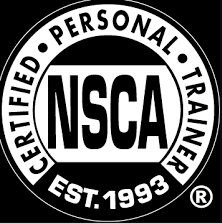
It is the personal trainer certificate awarded by the National Strength and Conditioning Association (NSCA-CPT). This is arguably the highest personal training certification in the entire Fitness industry. The NSCA is a highly respected association and focuses on strength training and physical conditioning.
One of the main advantages of passing the NSCA CPT exam is that you will obtain an internationally recognized qualification. The NSCA is known throughout the world and its certificates are recognized to work in many countries.
The NSCA title of personal trainer is international

If your dream is to work as a personal trainer in other countries around the world, this is your best option to take an approved personal trainer course . You can include the certification in your resume or present yourself as a certified personal trainer in countries such as the United States, Canada, Spain, Portugal, Greece, the United Kingdom, Ireland, France, Germany, the Netherlands, Italy, Poland, Korea, Shanghai, Japan, India. ..
CPT certification ensures that as a personal trainer, you have the basic knowledge to create safe and effective exercise programs. NSCA certified personal trainers are knowledgeable on all health and fitness related topics. This certification guarantees a fixed salary as a personal trainer as soon as you find a job.
NSCA CPT Certification sets you apart in the industry because it is NCCA Accredited. It is the gold standard in the Fitness industry and allows companies to know the quality of the certifications. The NCCA is the National Commission for Certifying Agencies. This organization is nationally recognized and ensures that exams meet the requirements to test people on the knowledge needed for the job.
Other major certifiers such as ACE or NASM are also NCCA accredited (so not just NSCA). However, it stands apart from them and confirms the certification in the sector.
The exam and study materials are sold separately, which is confusing compared to other certification organizations. Then, we will talk about the options and prices. We inform you that the preparation for the basic exam costs €396 (or about $435) for non-members of the association, and €273 (or about $300) for members. Signing up for NSCA membership is worth not only for the discount, but also for the benefits you will receive after becoming certified, which can improve your practice skills.
When considering your career options after becoming NSCA certified, it's important to keep in mind that your potential work isn't limited to the gym. It is normal to see NSCA CPT certified people working in non-gym settings. There are coaches in high schools, soccer strength training instructors, and similar fields. You don't have to limit yourself when you get your certification from this excellent strength and conditioning organization. This CPT certification is one of the best we've seen for being a personal trainer.
NSCA CPT Overview
| Online course + exam fees: €495 / €475 (members) |
| Prerequisites: Compulsory Secondary Education |
| Exam pass rate: 70% |
| Average time to complete the course: 6 months |
NSCA USA: Where to prepare for the CPT exam
All the information is available in the following section of the NSCA website . There, you have access to the content, the study material, the requirements to take the test and the centers where you can take the exam. For about $ 435, you can take the NSCA exam.
Course reputation and NSCA reviews
NSCA stands for National Strength and Conditioning Association. This nonprofit organization offers the best personal strength and conditioning training certifications in the industry.
She is well known for her Certified Strength and Conditioning Specialist (NSCA-CSCS) certification, but has a high level presence in all areas of Fitness. Obviously, this is not the only certifying fitness organization in the industry for personal trainers, but it is one of the best.
The NSCA offers you the following two qualifications:
- • CSCS
- • CPT
You may find it helpful to compare the NSCA CSCS and CPT certifications to determine which is best for you personally. The NSCA CSCS is considered the best strength and conditioning certification. Almost all strength coaches, college fitness instructors, and professional trainers have this type of certification.
There are many great strength and conditioning certifications out there, but we still insist that NSCA is the most recognized in the industry. NSCA is a pioneer in practical applications, research, continuing education, and opportunities for business collaborations. Its large global membership has 60,000 members and certified professionals.
Most of the NSCA certifications are accredited by the NCCA and therefore are held to high standards that ensure the quality of the materials.
The organization strives to work on the health of the population and improve sports performance. When it comes to training athletes, this is probably the best option for a personal trainer or future strength and conditioning coach.
All NSCA certifications with personal trainer course are well done and provide a great salary in the profession. The NSCA also has excellent certifications for military trainers, ex-military personnel, fire, rescue, and law enforcement. Therefore, the association covers a broad and diverse set of goals and opportunities with its certifications (like the tactical strength coach certification we mentioned).
Now, let's take a look at the details and benefits of NSCA membership!
Advantages of signing up for NSCA membership
Before you dive into the CPT certification , it's important that you know all that you can gain by becoming a member of the NSCA. Generally speaking, there are three membership options.
With all of these membership options, you'll have access to some of the key benefits of the NSCA:
- • Access to magazines
- • Exclusive content for members
- • Labor Relations
- • Discounts for courses
- • Benefits for members
- • Access to NSCA TV
Student membership costs $70 per year. This is available to full-time undergraduate and graduate students. You must verify your student status to be eligible for this low-cost membership.
The second is the professional membership, which is worth $130 per year. This is for working professionals (or would-be professionals) with current NSCA certifications. It offers you valuable discounts and the price is reasonable for the market.
The third and final membership is the ICC, priced at $299 per year. This includes all the benefits of the other two memberships and NSCA liability insurance. Personal Trainer Liability Insurance is the most valuable feature of this membership. Definitely worth it if you are a trainer with a large number of clients.
Is the NSCA personal trainer course worth it?
Yes, totally. The NSCA-CPT is great for anyone looking for an excellent personal training certification, especially those interested in sports performance. The NSCA has some of the most comprehensive personal trainer training programs and impressive resources available through membership (after you join the organization). Also, the base price of the exam is incredibly affordable compared to other big organizations like NASM or ISSA.
| Advantages of the NSCA Personal Trainer Course: |
| Qualification from an industry leader and practical application. |
| A complete book of more than 600 pages. |
| Excellent training for future advanced certifications. |
| It is recognized as a leading certification body in the industry. |
| Disadvantages: |
| Missing online video and audio formats. |
| Not too many practice tests are offered. |
| The exam is not included in the study packs. |
And what if we compare NSCA with other popular certifications? ISSA, NASM, ACE and ACSM offer the best training certificates. Each of these options excels in different areas.
ISSA is the best online training certification. Incorporate business skills into your certifications. As a result, the average salaries of ISSA trainers are likely to be higher than those of trainers from other organizations.
NASM is the best-known and leading institution in the field of recovery exercises.
ACE offers trainers some of the best behavioral training methods in their program.
ACSM is the oldest institution and, along with the NSCA, is known for its research in the exercise sciences.
Who can benefit from the NSCA Personal Trainer Course?
The NSCA Certified Personal Trainer Course is for individuals who want to train their clients in all aspects of fitness. It's not just a strength and conditioning accreditation!
The degree is perfect for those pursuing a professional athletic performance career. It is also for those who want to gain knowledge in the design of complex training programs.
The qualification is not as necessary for those who want to design simple training programs or do not seek to acquire too deep knowledge of sports science.
Options for the approved personal trainer course and price

There are four options to purchase the course. One of them consists of paying only for the exam. The other three alternatives are different study packs that do not include an exam.
Remember that the exam and the study material are paid separately (they are two separate purchases for your study program). This seems inconvenient, but the organization gives you all the facilities you need.
• Exam Only : At NCSA the price of registration for the CPT exam varies depending on whether or not the candidate has membership of the association. For non-members, the price is €396 / $435. For association members, the price is €273 / $300. The membership is worth it because the difference is noticeable.
• NSCA-CPT Digital Pack : This program is designed to help people become familiar with the style of certification exam questions and materials. Simply put, it contains the NSCA CPT study guide and over 200 practice questions to help you with the exam. Its approximate value is €195 / $214.
• NSCA-CPT Essential Pack : This is the ideal option for those who are already familiar with exercise science and perhaps have a degree in the field. This pack contains only the basic materials needed for training: the NSCA Personal Training Essentials textbook, the NSCA CPT Training Manual, and over 200 questions. The estimated value of this pack is €294 / $323.
• NSCA-CPT Essential Plus Pack : This last package is the most complete. It is designed for people with little or no background in science or who simply want to have as much NSCA training material as possible. This pack includes the NSCA Essentials of Personal Training Manual, Exercise Techniques Manual Third Edition, NSCA CPT Study Manual, 200+ Practice Questions for the Certified Personal Trainer Exam, and a few other smaller items. (certification manual). The value of the pack is about €517 / $567.
There are no free personal trainer courses for this certification.
Is NSCA worth the price?
NSCA offers competitive prices on its study packs and exams. The association guarantees some of the best prices in the industry. NSCA is worth 100% of the price it charges for its materials because its program is accredited by the NCCA. When you add the benefits of your membership, NSCA is well worth it.
You can start preparing for the NSCA CPT by consulting the free study guide and practice test offered by the association. This will give you a better idea of what to expect. If you're worried about spending the money and failing the NSCA exam, you're better off studying at a third-party academy that offers a guarantee of passing the exam. There are several independent academies that offer courses to pass the NSCA tests (you don't have to stick only to the association packs).
What materials will you need to train as a coach?
NSCA Manual Essentials of Personal Training PDF
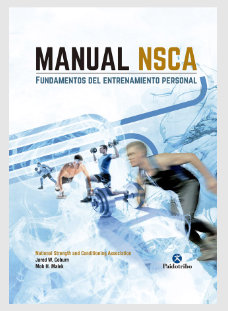
The association does an excellent job of providing value and comprehensive information throughout the training book and manual. Here, we will take a look at what the textbook, the main training material for all candidates seeking certification, looks like.
The textbook for the CPT certificate is called "Essentials of Personal Training" . This book contains a wide variety of material and gives excellent attention to strength and conditioning. There are 25 chapters spread over 600 pages. This may seem overwhelming, but the truth is that it has one of the best designs as a personal training textbook. Each chapter deals with a unique and well-defined topic, so you'll be able to follow whatever you're looking for while you study.
NSCA Personal Training Book Chapter List :
- 1.- Structure and function of the muscular, nervous and skeletal systems
- 2.- Cardiovascular system and gas exchange
- 3.- Bioenergetics
- 4.- Biomechanics
- 5.- Adaptations to strength training
- 6.- Physiological responses and adaptations to aerobic resistance training
- 7.- Nutrition in personal training
- 8.- Exercise physiology for the personal trainer
- 9.- Customer advice and health assessment
- 10.- Selection and implementation of the fitness assessment
- 11.- Protocols and standards of physical fitness tests
- 12.- Ball exercises for flexibility, body weight and stability
- 13.- Resistance training methods
- 14.- Methods of cardiovascular training
- 15.- Development of the resistance training program
- 16.- Development of an aerobic resistance training program
- 17.- Plyometric and speed training
- 18.- Pre-adolescent, elderly or pregnant clients
- 19.- Clients with nutritional and metabolic problems
- 20.- Customers with cardiovascular and respiratory diseases
- 21.- Clients with orthopedic, traumatic and rehabilitation problems
- 22.- Clients with spinal cord injury, multiple sclerosis, epilepsy and stroke
- 23.- Resistance training for clients who are athletes
- 24.- Arrangement and maintenance of equipment and facilities
- 25.- Legal aspects of personal training
This is unique in that some personal training books do not sufficiently differentiate training styles. In other books, it is not easy to find what you want to consult. With the NSCA book, you should have no problem finding exactly what you need. The material is well separated in each chapter. Download the NSCA Essentials of Personal Training PDF manual.
Let's look at all the categories on the agenda and how the NSCA explains it in each case.
1. The fundamentals of exercise science
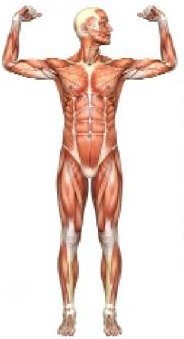
The fundamentals of exercise science are covered excellently in this book. In this case, the association does very well when compared to other CPT certificate organizations. Topics such as biomechanics, bioenergetics, physiology and others are widely covered. All other organizations should follow a foundation like the one set out in the NSCA book .
It also adds many of the fundamentals used in other certifications, such as nutrition, strength, conditioning, and rehabilitation . For the price of the book, you're going to get some good insights into the science of exercise.
A total of 8 chapters cover the science of exercise (it's a fifth of the book). This will be a great motivation for you as you study for your degree. It is also a great challenge for people with no experience in the field.
For example, it goes into great detail on muscle fibers or the Krebs cycle. You need to know things as specific as the breakdown of muscle fibers and myofilaments, all the way in and out of the Krebs cycle.
This topic can get quite specific, which is great for a personal training textbook.
2. Behavioral training

This topic is the least appreciated of the training materials. It would be nice if the NSCA expanded it in the future. The client evaluation section is fine, but the certification does not help future coaches much with training and goal setting. However, this is easily offset by the level of knowledge and experience in all other sections, but it should be noted that this part of the text is small. Chapter 9 is the only section that focuses on this. After a while, we go straight to health assessments and inspections.
3. Evaluation of the client's health
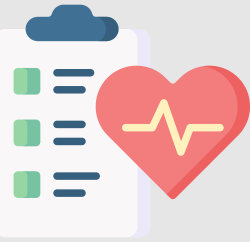
The evaluation of the user's health is a subject covered and adequately focused thanks to all the necessary documentation for the different scenarios that you will encounter as a personal trainer. You can find all of these documents in text and at NSCA online . They are easy to understand and the book describes their use and relevance in the realm of personal training and in interactions with other health professionals.
It's great to see the importance of health assessments and how many possibilities and scenarios exist to carry them out. This section links directly to the next section on physical activity assessment. The two sections on health exams in this book are in the same field.
4. Physical activity test

The physical activity assessment follows immediately after the section on health assessment in the training manual. This part is very important. The NSCA's focus on training athletes has really allowed the organization to reduce the amount of movement testing and improve the format of the text.
In addition to the chapters on proper fitness assessment and exercise technique, there are detailed sections on the proper selection and administration of these exercise tests. This is an excellent example of how a training organization should evaluate its clients. You get all the tools. Even the differences for different populations are addressed. This can help future personal trainers and ease the transition into their careers with clients.
Many of the exercises are described in great detail. In other training books, the exercises are not as detailed. The guide also offers help in injury prevention by learning a person's movement history. Human kinetics is an important part of training that not all certifications cover.
5. Resistance and aerobic training
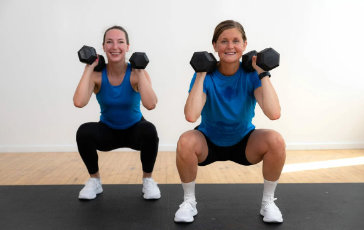
Both resistance training and aerobic fitness training are excellently taught in this personal training textbook. Both are in more than one chapter, and it's helpful to find specific features of each training style.
The detail and relevance of resistance training and aerobic fitness is excellent. The book even makes a distinction between coaching the general public and working with athletes. In other books, you'll typically only see workouts for the general public, as this is the typical target group for the certified trainer.
Due to the close link between the NSCA and strength and conditioning, this CPT certificate is focused on athletes. However, the chapter on advanced aerobic fitness, plyometrics, and speed is not on the same level as the chapter on resistance training for athletes. The title makes it a bit inconsistent, but the internal material is appropriate.
6. Training for the special population
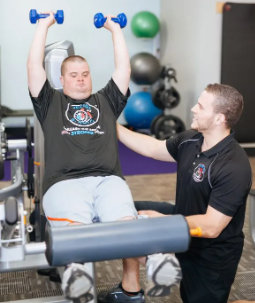
Training for the population with special needs is well implemented. This part is perhaps even better than other certificates, as the specific populations and their conditions are grouped in separate chapters. Normally, one chapter is devoted to special circumstances that are different from the general population, but the NSCA and their CPT certification decided to split it into six different chapters.
The material presented here ranges from personal training for the elderly to any population group with special considerations or contraindications for training. There is excellent value in this section, and it will help all personal trainers develop the skills to meet the specific needs of their clients with more individualized programming.
7. NSCA Nutrition

The NSCA sets a strong nutrition standard for its CPT certifications. Like most other organizations, the NSCA does not have its own nutrition certification.
All other CPT programs comparable to the NSCA have their own certifications and nutrition specializations. Fortunately, with the NSCA this is not a negative unless the person specifically wants their CPT and nutritional certification to be from the same company.
The NSCA fits well with the trainer's practice and ensures that all trainees know what they can and cannot do for their clients in terms of nutrition. From there, all the basic assumptions that trainers hear from their clients are taught. There are topics like weight gain or loss, food choices, and supplementation.
Coaches are unlikely to have a problem with nutrition advice and guidance. In fact, the information provided in this certificate may even inspire you to take a more active role in your own health care.
How to prepare for the NSCA CPT exam online and study materials

Even the most comprehensive NSCA training materials are not quite up to the level of ACE or NASM materials. The practice test and questions are very difficult, but you just don't have as much practice preparation for the test. Other companies give you modules to follow along with the course material or audio guides to synthesize the content. However, the NSCA only gives you a basic study guide and that's about it.
This works well and you can basically study the textbook, although you have to prepare for a few months because the book is over 600 pages. For a complete understanding, it is advisable to create an outline with the study content. Consult the NSCA study packs that we explain.
Requirements to be an NSCA personal trainer
• Have completed at least 18 years.
• Have completed Secondary Education or equivalent.
• Your valid documentation must be available for the exam.
• AED and CPR certifications are required (this is a must).
Salary
The average NSCA CPT certified trainer is estimated to earn around €45,141 or $49,739. More or less, it is the same as the salaries of other major CPTs. Of course, your salary will depend on your overall talent and experience, but the company that certified you will also play a role.
You can also check out NSCA CSCS certification, as strength and conditioning coaches can earn much more than regular trainers depending on where they work.

How to pass the NSCA-CPT exam
The NSCA CPT exam has 140 scored questions and 15 unscored questions that will be used for future testing purposes. You have 3 hours to complete the exam. The exam tests the candidate and her knowledge and skills in the following four areas:
- Client counseling/fitness assessment (23% of the test).
- Design of the training program (32% of the test).
- Training methods (31% of the test).
- Safety, emergency procedures and legal issues (14% of the test).
The NSCA-CPT test contains at least 25 videos or images of CPT questions to test your knowledge in various areas.
The pass rate in recent years has been 72% or so. That's a much higher percentage than his other certification (strength and conditioning). The fact that the pass rate is high does not guarantee that you will pass the exam. Make sure you are as prepared as possible for this certification exam because the NSCA CPT test questions can be difficult.
You will have to wait 90 days before you can retake the CPT certification exam. It's a good idea to look up NSCA practice tests to understand question styles and how you should study to prepare for the test.
NSCA continuing education and recertification
Recertification in the NSCA organization is slightly different from other training certifications. The recertification cycle is three years, so you need to know when you will earn your certification in the three-year period.
To keep things simple, you require about 2.0 continuing education units, or CEUs. CEUs must be earned from organizations qualified and deemed worthy by the NSCA. Basically, Continuing Education 2.0 units consist of approximately 20 hours of attendance in a specific type of class, 2 hours of presentation in a certification class, or a combination of certain NSCA-approved publishing hours.
You must inform the NSCA of your training hours for approval, which makes the whole process a bit more complicated than in other organizations. However, once you've reported your participation, times, and posts, it becomes much easier.
It's always good to know where to get easy CEUs for recertification, especially as the time approaches. The organization also offers NSCA CEU courses for people to study.
Be sure to check the official NSCA website for the latest and most accurate recertification requirements.
All NSCA certifications
Here is the list with the other NSCA courses :
- • Certified Strength and Conditioning Specialist (CSCS)
- • Certified Performance and Sports Scientist (CPSS)
- • Certified Special Population Specialist (CSPS)
- • Tactical Strength and Conditioning Facilitator (TSAC-F)
Doing these courses will earn more CEUs and credentials in your name. Completing any of these courses is an excellent personal approach to recertification.
NSCA course final opinions
| Advantages: |
| - Excellent coverage of topics in general. |
| - The price of the exam is cheap. |
| - The organization is highly respected. |
| Disadvantages: |
| - Study resources are limited. |
| - There is little emphasis on behavioral training. |
| - If you have to repeat the exam, this can be expensive. |
Overall, we give NSCA CPT a 9/10 rating . This is a very valid certificate with a lot of information for all new trainers. The organization is highly respected and the price of CPT is quite affordable. However, the study resources are scarce compared to other programs such as ISSA, NASM or ACE, so we cannot give it full marks.
The NSCA personal trainer certification is still very good and can make it easier for you to get into more advanced certifications. There is even a strong market for small groups of NSCA CPT certified personal trainers.
Along with NASM and ACE, the NSCA is one of the leading organizations in the trade. Fortunately, their CPT certification is highly respected and even sets itself apart from the competition with exercise fundamentals, resistance training, and the specifics of special population training.
The NSCA pros definitely outweigh the cons. It is one of the best personal trainer certifications on the market. This certificate would be almost perfect if it included more behavioral training in the program and also improved some aspects of the test.
We hope this review of the NSCA Certified Personal Trainer Course has helped you decide on your next career path as a personal trainer.
NSCA CPT Certification Frequently Asked Questions (FAQs)
Finish by reading the most common questions about this personal trainer title.
What is the NSCA?
It's the National Strength and Conditioning Association. It is a nonprofit professional health and fitness organization founded in 1978. The NCCA recognizes this organization. His CSCS certifications and sports-specific training are known. You will see many trainers with NSCA certifications.
What degrees does the NSCA offer?
The organization offers you a general personal training certification and also several specialized certifications:
– NSCA Certified Personal Trainer (NSCA-CPT)
- Certified Strength and Conditioning Specialist (CSCS)
- Certified Special Populations Specialist (CSPS)
- Tactical Strength and Conditioning Facilitator (TSCF)
- Certified Performance and Sports Scientist (CPSS) )
What is the price of the NSCA CPT exam?

Costs for the NSCA CPT exam vary. If you are a member of the association, the certification costs $300, while for non-members it costs $435 to take the exam.
What is the pass rate for the NSCA exam?
Beginners have a 72% pass rate for the NSCA CPT exam and a 56% pass rate for the NSCA CSCS exam . Preparing for the NSCA exam is very important, so make the most of your study with as many NSCA CPT practice questions as possible.
How can I get NSCA CPT certified?
- Go to the association's website.
– Choose the certificate you want.
- Register for the exam.
- Choose a place.
- Take the exam after registration is complete and before it expires.
- Pass the exam and you will become an NSCA certified and accredited personal trainer.
- You will need to have a CPR/AED card prior to the exam. You must also be at least 18 years old and have ID.
How do I get to be an NSCA strength and conditioning specialist?
The registration process for this exam is similar to the NSCA-CPT; although the requirements vary. You must have a bachelor's degree or be currently a college student at an accredited institution.
Is the NSCA CPT exam difficult?
The NSCA CSCS certification exam is the most difficult to pass in the industry. However, the NSCA CPT exam is slightly less difficult.
How long is the validity of the NSCA certification?
NSCA certification is valid for three years . Then, you must recertify yourself. To do so, you must complete NSCA Continuing Education Units (CEUs). To complete these CEUs, you have a variety of classes to choose from. Once you have the required CEUs, you can submit your credentials for recertification. An additional fee is charged for recertification.
What salary can you expect for an NSCA personal trainer?
The average salary for a personal trainer with this qualification is approximately $48,584 per year, give or take depending on the type of environment. Breaking into the market can be difficult without solid personal training advice. Always make sure you know how to get customers and keep your customer base.

Does the NSCA offer study materials and other resources?
Absolutely! NSCA has test preparation centers to help students pass their exams with ease. As we saw, there are several study packs to choose from, with prices ranging from $29.95 to $567.
Does the NSCA offer you internships?
Yes. NSCA offers internships or tutoring services for certain courses. Following a personal trainer is a good idea to understand the job and practical experience. NSCA internships are a great resource for professional development.
Is the NSCA a good certifying body?
Yes, this body has one of the leading CPT certifications in the health and fitness industry in the United States. Their titles are also recognized in 70 countries around the world. The association has many peer-reviewed research publications on strength, conditioning, and more.
What are the contact details of the NSCA?
NSCA is located at 1885 Bob Johnson Drive, Colorado Springs, CO 80906, Colorado, USA.
For further questions, you can email him at nsca@nsca.com .




![CÓMO MONTAR UN GIMNASIO EN CASA CON POCO PRESUPUESTO [GUÍA 2024]](/modules//smartblog/images/296-home-small.jpg)




